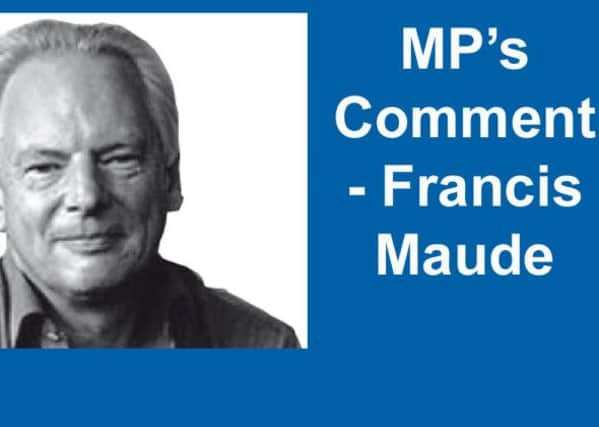Francis Maude: coping with legacy of reckless Labour


The Coalition Government came to office in the wake of the most damaging financial crisis to have hit our country in generations. The result was a truly alarming recession, now reassessed to have been a staggering 7.2 per cent drop in GDP from peak to trough between 2008 and 2009.
To give you some idea of what that means that’s £112 billion wiped off our economy or around £3,000 for every household in the UK. It means that our economy will be 17 per cent smaller than it was expected to be – the long-term permanent legacy of a reckless Labour Government that promised it would ‘abolish boom and bust’.
Advertisement
Hide AdAdvertisement
Hide AdAnd due to its unsustainable level of public spending we inherited the worst public deficit in our peacetime history. The Government was spending £4 for every £3 in revenue; borrowing £1 in every £4 just to keep the lights on, the pensions paid, teachers in schools and nurses and doctors in hospitals.
So we set out a five-year plan in 2010 to rebuild the British economy. Three and a half years on we have stayed the course and are now finally starting to see some real progress.
The deficit is down by a third, forecasts show that growth is up – indeed, Britain is currently growing faster than any other major advanced economy – and employment is at an all-time high.
But, as the Chancellor said, ‘the job is not yet done’. Even with this much faster growth, by 2015 the economy will only just have recovered to the level it was at before Labour’s disastrous recession began in 2008. So the recovery is under way. But my word! There’s so much more to do.
Advertisement
Hide AdAdvertisement
Hide AdAmong the wide range of plans announced in the Statement, there are a number of measures aimed specifically at continuing to tackle the deficit and delivering sound public finances.
For instance a welfare expenditure cap will be introduced to avoid the spiralling welfare spending which we saw under the last Government – between 2000 and 2010 welfare spending increased by 58 per cent and the number of households where nobody worked had nearly doubled.
And there’s more work for me. My day job in Government is to cut the cost of delivering public services to make the money go further and buy more. So I’ll be overseeing the £1.1 billion Whitehall Departmental budget reductions announced in the Statement.
It’s not the most glamorous job in politics. But it really matters.